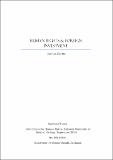Human rights and foreign investment
Date
2015-03-27Author
Curtis, Joshua
Metadata
Show full item recordUsage
This item's downloads: 2124 (view details)
Abstract
This study details the mechanisms of a neoliberal ideology operative in the current international approach to foreign direct investment (FDI). It charts an increasing dependency on FDI within the process of international financing for development and illustrates this in regard to the Monterrey Consensus and the Doha Declaration. It then describes the structure and intricacies of international investment law as a global administrative (or global constitutional) disciplinary regime that enforces a dependency on FDI as the ideal development solution.
The regulatory gaps and contradictions inherent in this system are explored through the lens of human rights law, particularly with reference to the developing extraterritorial obligations on wealthy states emerging from recent research on socioeconomic rights. These obligations form a framework that is applied to the mutually reinforcing systems of investment law and financing for development in order to test their capacity to redress these gaps and contradictions.
The capacity clearly exists, and on this basis it is argued that the process of international negotiations on investment agreements must be framed by appropriate parameters drawn from extraterritorial human rights obligations, to ensure that each State observes its baseline customary law duty to respect the human rights of all concerned. Furthermore, to ensure this observation the current neo-liberal dependence on FDI in development financing must be re-balanced and re-thought. To this end the convergence between certain heterodox economic viewpoints and core human rights principles in relation to development financing is outlined for further research, potentially forming a joint force sufficient to move a deeply ingrained and detrimental neo-liberal ideology.


